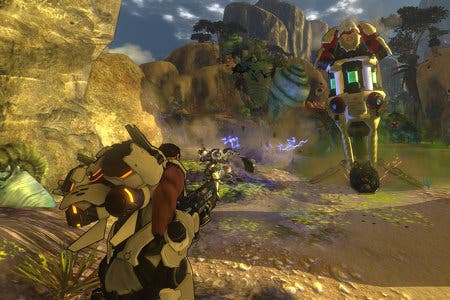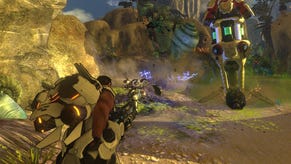Firefall dev "checking out" Ouya, casts doubt on Microsoft and Sony's console future
Red 5's Kern personally backs Kickstarter, hopes for dev kit.
Outspoken ex-World of Warcraft lead and CEO of Firefall developer Red 5 Studios Mark Kern has railed against current consoles and remains skeptical of their successors, yet he's interested in developing for Ouya.
"For the price of the Kickstarter why not try it? Yeah, they may fail. Some people are saying 'oh, it's vaporware.' But I want to get behind people that want to challenge the status quo, who want to try something different," he said to us in a recent interview.
"So I contributed personally at a level I was comfortable at and then my company contributed to at a level to get a dev kit and hopefully we'll see that and maybe we won't, but it's a risk that we take and it's for something better."
The big appeal of Ouya to Kern is the open-platform. According to him, the platform holders' closed distribution model is stifling innovation and common household technologies are rendering the current console climate moot.
Speaking of the current consoles' closed distribution channel he said, "in order to stand out from the crowd you have to spend as much on marketing as you did developing it... this is not a sustainable model. Teams have gotten to have to be larger and larger and larger to justify the $60 up front model."
"It's killing innovation because no one can take those risks anymore or try something new with those kinds of numbers. I think that's bad for gamers and I think that's cripplingly bad for developers. And to be honest, I don't see Sony or Microsoft embracing the openness of the changes that are happening in the gaming industry right now"
He seemed particularly skeptical of Sony. "Sony's not had a great track record with open models. They tried to compete with iTunes back in the day and they're heavy on DRM, which I think is a big, huge negative for our industry, and I don't think that DLC models of sort of unlocking content as you go is a way that gamers want to play."
"The reason we have no innovation left on consoles is because you have to spend so much money to make your game appeal to widest possible audience on that platform which is a closed platform, so that's a limited number of users, right? Versus a PC with a free or open distribution model you can build a community around your game."
He cited Minecraft as a perfect example of this. "Can you imagine pitching that to Sony?... 'It's going to look all 8-bit. And it's going to have these cubes.... you bang on these cubes and you get something out of it and you combine it and you can make another cube.' They'll say you're insane. That thing would have never been greenlighted on a Sony or Microsoft platform."
Kern has no plans to bring Firefall to a future Sony or Microsoft console and remains skeptical at how successful they'll be. "I have an overall concern about how many people are going to buy these new consoles because everyone now is carrying a tablet, an iPhone, or they're at work on a PC. There's a lot of competition on the web for your attention."
"I think more and more it's hard to justify a separate device to do gaming if - and this is the big qualifier - if you can get that experience or an equivalent experience on something else. That something else hasn't arrived there yet," he said, but cited Ouya as a potential solution.
I tell him one of the big hindrances to PCs is that they're constantly getting outdated and require upgrades, where with a console you can buy one and - assuming it doesn't break - it will be a viable gaming platform for five years.
"Does it really?" He said. "Technology moves at a very fast pace. Within six months that console, no matter how new it is, is going to be out of date. And probably within a year or two after it the latest tablet will be have as much power as that console."
He predicts that in the not-too-distant future, TVs will share a wireless streaming standard and people will be able to fire up a game on their tablet, stream it to their TV, and play it with a controller. That way developers wouldn't be beholden to a few scant platform holders and consumers wouldn't have to shell out so much cash for both hardware and software.
But would people adapt to this quicker cycle? For many, swift upgrades in technology is a turn off. Spend a fortune one year and by the next it's only worth half the value. A platform that remains across the board for everyone for a half decade certainly has its appeal.
Kern countered by saying new tech is becoming increasingly affordable. "You can get a tablet for $200 now... the pricing are going to keep coming down." He also noted that people upgrade other devices like phones more frequently than consoles because a lot of those costs are subsidised by carriers.
Comparing this to consoles he explained, "They have to be more open for the cost of entry... If you're only spending $200 maybe two years later you're fine getting another console."











